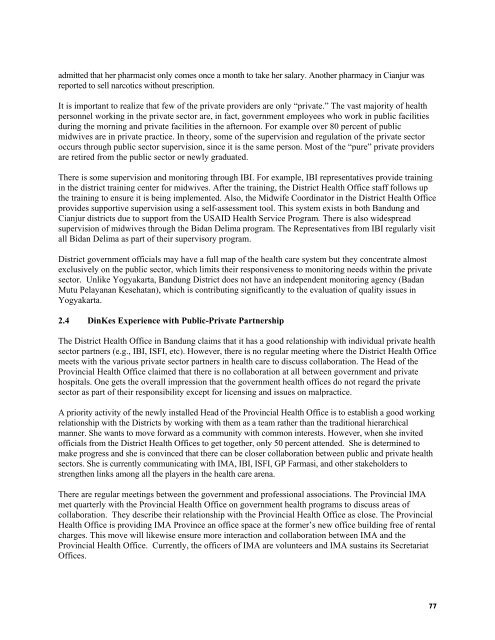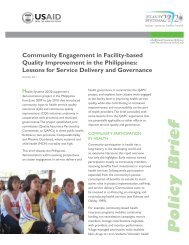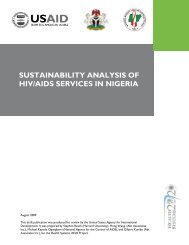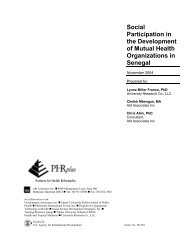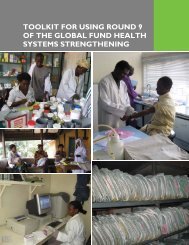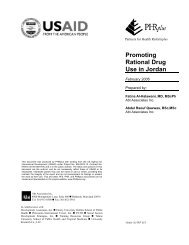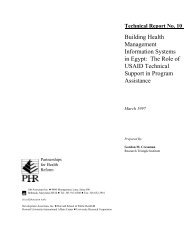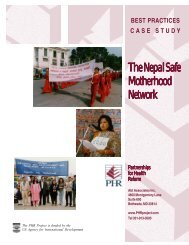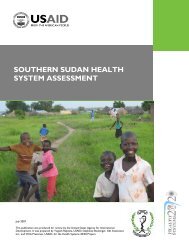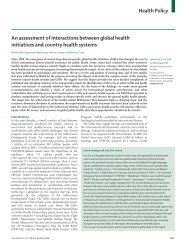How can services provided at private facilities be better integrated into thehealth system to ensure better delivery and monitoring of private healthservices (e.g. TB, ANC)?2.2 Reporting on private providers to the District <strong>Health</strong> OfficeThe District <strong>Health</strong> Office keeps records of all private providers by category. There are 26 categoriesincluding private hospitals, clinics, midwives, pharmacies. There are a total of 3,603 private providersincluding 458 private midwives. They update private providers every year and private providers need torenew their license every 5 years. In Bandung district, they had data from 2003. In Cianjur district, theyhad less information at the district level because they have fewer private providers. For example, there areno private hospitals. However, the Provincial <strong>Health</strong> Office has data on all private providers in theprovince, since they are ultimately responsible for licensing.It is unlikely that official data is reliable due to non-compliance by private providers to submit updatedinformation. There is currently no real incentive to comply. For example, many of the private hospitalsdo not report data on the treatment of tuberculosis and yet they provide treatment. Only those hospitalsthat receive drugs from the health office submit data on TB. To the end of 2008, the Provincial <strong>Health</strong>Office Head reported that only 10 percent of private hospitals submitted their reports despite the fact thatthere is an existing regulation for hospital compliance with regards to submission of reports.In terms of MCH services, there is regular reporting to the District <strong>Health</strong> Office from private midwives.There is much better compliance from Bidan Delima compared to other midwives. However, there isvirtually no reporting from private hospitals.Private providers are not required to provide any information on their fees to the Provincial or District <strong>Health</strong>Office. The government health offices only know whether the private providers are licensed.2.3 Role of DinKes in supervision and monitoring of private providers and ensuring theiroverall qualityThe primary role of the District <strong>Health</strong> Office regarding the private sector is to license private providers.For midwives, the initial license is issued by the District <strong>Health</strong> Office upon recommendation by IBI.The renewal license after 5 years is issued by the District <strong>Health</strong> Office upon recommendation by IBI.According to IBI Province, there is no competency test conducted for midwives prior to initial or renewalof license. They plan to conduct it this year.Beyond this, they see their role as very limited. Even in Bandung District, which is more active thanCianjur and has more private providers, they play a limited role in monitoring the quality of providers.They check the clinic facilities such as equipment rather than the quality of care. They also have a limitedrole in supervision because of limited budgets. Given the large number of private providers in BandungDistrict, they have limited staffing and therefore cannot visit private providers regularly.As an example, private pharmacies are supposed to have a pharmacist present. The District <strong>Health</strong> Office alsoconducts inspection of the various pharmacies. Pharmacists should only have one practice. It is, however, aknown fact that pharmacists practice in multiple sites making their license available to pharmacy owners fortheir facilities to comply with business permit requirements. The Balai POM at the provincial level coordinatesclosely with the District <strong>Health</strong> Office. Inspections are supposed to be conducted twice a year. However, this isdifficult to enforce, as per the Bandung District <strong>Health</strong> Office. In fact, in Cianjur district, a pharmacy owner76
admitted that her pharmacist only comes once a month to take her salary. Another pharmacy in Cianjur wasreported to sell narcotics without prescription.It is important to realize that few of the private providers are only “private.” The vast majority of healthpersonnel working in the private sector are, in fact, government employees who work in public facilitiesduring the morning and private facilities in the afternoon. For example over 80 percent of publicmidwives are in private practice. In theory, some of the supervision and regulation of the private sectoroccurs through public sector supervision, since it is the same person. Most of the “pure” private providersare retired from the public sector or newly graduated.There is some supervision and monitoring through IBI. For example, IBI representatives provide trainingin the district training center for midwives. After the training, the District <strong>Health</strong> Office staff follows upthe training to ensure it is being implemented. Also, the Midwife Coordinator in the District <strong>Health</strong> Officeprovides supportive supervision using a self-assessment tool. This system exists in both Bandung andCianjur districts due to support from the USAID <strong>Health</strong> Service Program. There is also widespreadsupervision of midwives through the Bidan Delima program. The Representatives from IBI regularly visitall Bidan Delima as part of their supervisory program.District government officials may have a full map of the health care system but they concentrate almostexclusively on the public sector, which limits their responsiveness to monitoring needs within the privatesector. Unlike Yogyakarta, Bandung District does not have an independent monitoring agency (BadanMutu Pelayanan Kesehatan), which is contributing significantly to the evaluation of quality issues inYogyakarta.2.4 DinKes Experience with Public-Private PartnershipThe District <strong>Health</strong> Office in Bandung claims that it has a good relationship with individual private healthsector partners (e.g., IBI, ISFI, etc). However, there is no regular meeting where the District <strong>Health</strong> Officemeets with the various private sector partners in health care to discuss collaboration. The Head of theProvincial <strong>Health</strong> Office claimed that there is no collaboration at all between government and privatehospitals. One gets the overall impression that the government health offices do not regard the privatesector as part of their responsibility except for licensing and issues on malpractice.A priority activity of the newly installed Head of the Provincial <strong>Health</strong> Office is to establish a good workingrelationship with the Districts by working with them as a team rather than the traditional hierarchicalmanner. She wants to move forward as a community with common interests. However, when she invitedofficials from the District <strong>Health</strong> Offices to get together, only 50 percent attended. She is determined tomake progress and she is convinced that there can be closer collaboration between public and private healthsectors. She is currently communicating with IMA, IBI, ISFI, GP Farmasi, and other stakeholders tostrengthen links among all the players in the health care arena.There are regular meetings between the government and professional associations. The Provincial IMAmet quarterly with the Provincial <strong>Health</strong> Office on government health programs to discuss areas ofcollaboration. They describe their relationship with the Provincial <strong>Health</strong> Office as close. The Provincial<strong>Health</strong> Office is providing IMA Province an office space at the former’s new office building free of rentalcharges. This move will likewise ensure more interaction and collaboration between IMA and theProvincial <strong>Health</strong> Office. Currently, the officers of IMA are volunteers and IMA sustains its SecretariatOffices.77
- Page 1:
PRIVATE SECTOR HEALTHCARE IN INDONE
- Page 5:
PRIVATE SECTOR HEALTH CAREIN INDONE
- Page 8 and 9:
7. Rationalizing Use of Medications
- Page 11 and 12:
ABBREVIATIONSANCAskesAskeskinAusAID
- Page 13:
THEUSAIDVATWHOTotal health expendit
- Page 17 and 18:
EXECUTIVE SUMMARYAs documented in I
- Page 19 and 20:
By using their power to select whic
- Page 21:
higher reimbursement for complex de
- Page 25 and 26:
2. BACKGROUND2.1 GENERAL BACKGROUND
- Page 27 and 28:
While decentralization of the healt
- Page 29:
FIGURE 1: TOTAL EXPENDITURES ON HEA
- Page 32 and 33:
poor, which only allows use of publ
- Page 34 and 35:
Lack of overall investment in healt
- Page 36 and 37:
• Pharmacists and drugsellers - A
- Page 38 and 39:
4.2 ASSESSMENT APPROACHData collect
- Page 40 and 41:
practice, however, limited resource
- Page 42 and 43:
Dinas to the hospital detailing the
- Page 44 and 45:
Unlike Muhammadiyah and NU faciliti
- Page 46 and 47:
TABLE 3: POPULATION COVERAGE BY HEA
- Page 48 and 49: customary fees. At the same time, i
- Page 51 and 52: 7. RATIONALIZING USE OFMEDICATIONS7
- Page 53 and 54: too few medicines to meet the publi
- Page 55 and 56: 8. PHARMACISTS ANDDRUGSELLERS AS PA
- Page 57 and 58: district provides TB drugs to priva
- Page 59 and 60: 9. ROLE OF PROFESSIONALASSOCIATIONS
- Page 61 and 62: IMA is involved in any allegations
- Page 63 and 64: 10. CONCLUSIONS ANDRECOMMENDATIONSI
- Page 65: If Indonesia is to achieve its prio
- Page 68 and 69: • Supporting the mapping of all f
- Page 71 and 72: ANNEX A: ASSESSMENT GUIDEIndonesia
- Page 73 and 74: Key Informants at Provincial LevelK
- Page 75: Key InformantsoooIBI, and memberrep
- Page 78 and 79: Assessment Question Approach/Backgr
- Page 80 and 81: Indicator Number Data Source and No
- Page 82 and 83: 1.3.4 DinKes Experience with Privat
- Page 84 and 85: The team interviewed a manager 16 a
- Page 86 and 87: They have used many different healt
- Page 88 and 89: In Yogyakarta Province, there are 1
- Page 90 and 91: graduates to work immediately in 24
- Page 92 and 93: Muhammadiyah is a 226 bed hospital
- Page 94 and 95: Dinas Yogyakarta31. Mardiningsih, S
- Page 96 and 97: 2.1 Provincial InformationThe popul
- Page 100 and 101: The Provincial Health Office meets
- Page 102 and 103: from multiple sources: 40 percent f
- Page 104 and 105: 2.9 Licensing and Oversight of Phar
- Page 106 and 107: As per IMA Propinsi, they meet with
- Page 108 and 109: It was mentioned that the budget fo
- Page 110 and 111: • Private midwives are willing to
- Page 112 and 113: etween PKBI and the District Health
- Page 114 and 115: Cahya Kawaluyan Hospital has adapte
- Page 116 and 117: the midwife to charge a slightly hi
- Page 118 and 119: Involving Physicians in DOTS. A sig
- Page 120 and 121: Ikatan Bidan Indonesia (IBI) West J
- Page 122 and 123: Indicator DKI West Jakarta Data Sou
- Page 124 and 125: visited an average of over 60 perce
- Page 126 and 127: 3.9 Potential role of professional
- Page 128 and 129: members who pay membership fees. Th
- Page 130 and 131: emainder paying out of pocket. Reve
- Page 132 and 133: 3.20 Indonesian Pharmacists Associa
- Page 134 and 135: OtherApotek Gitamara, Jl. Kemanggis
- Page 136 and 137: 13. Government of Indonesia, World
- Page 138: 41. Thrabany, Hasbullah, et al. 200


